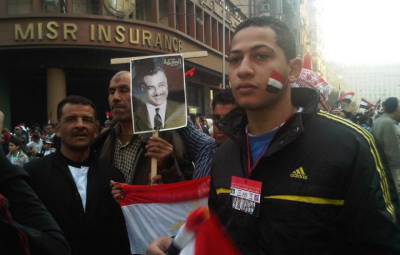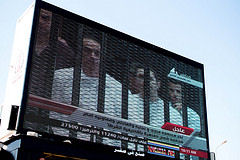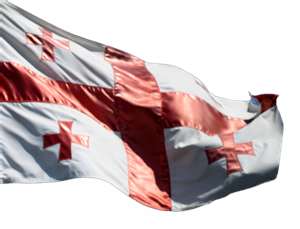
The Myth of ‘Sixty Years of Oppression’
Reem Abou-El-Fadl has recently published an article in Al-Akhbar English newspaper entitled ‘From Nasser to Tantawi: The Myth of “Sixty Years of Oppression”‘. The article considers the connections that have been made in Egypt between the July 1952 Revolution, launched by the Free Officers movement, and the January 2011 Revolution, launched by this year’s popular uprising in Egypt. The article acknowledges that military officials first came into government after the July Revolution, but it goes on to explore the deceptive myth of ‘sixty years of oppression’ since, which has been heard often in recent months. ‘Yet today’s generals are protecting an entirely different set of interests from those important to the Free Officers. They have presided over months of delay …
Talking with terrorists? A Q&A with Sir Graeme Lamb
Sir Graeme Lamb is not fond of theorising. However, the former Director of the UK Special Forces can claim to have played an important part in the initiative that pacified large parts of Iraq after 2006. Much of what he argued for is now part of the official US counterinsurgency strategy. But while it is easy for academics and other observers to demand that armed forces should ‘reach out’ to insurgents, there is precious little guidance on the practicalities of initiating a meaningful conversation with the people determined to bomb the foreigners out of their homeland. Lamb shared his insights as part of Emma Sky’s seminar series in Oxford on 25 October, jointly hosted by the Changing Character of War …
A New Phase for Conflict Resolution in Transnistria: Prospects or Risks for European Security?
The deadlock in conflict resolution in Transnistria – as ‘frozen’ as it was – seems to start ‘melting’. It was about a year ago that Russian President Dmitry Medvedev tabled an exchange proposal to German Chancellor Angela Merkel: Russia would facilitate the resumption of the 5+2 negotiations on Transnistria (Transnistria, Moldova, Russia, Ukraine and OSCE, plus US and EU as observers) in exchange for setting up a joint EU-Russia council where Moscow would have a say in some EU decision-making procedures. Both sides stressed that their conditions should be satisfied first and rejected any speculations about preconditions. It is not surprising that after 20 years of Russian support to Transnistria, there is a lot of scepticism about whether Russia’s willingness …

Trying Mubarak
I have recently published an article entitled ‘Trying Mubarak’, discussing what has been called ‘the trial of the century’ in Egypt. I argue that the trial of former Egyptian President Hosni Mubarak, which began on 3 August 2011, represents a barometer of the fortunes of the January Revolution as a whole. A common challenge confronts both the achievement of accountability in the trial, and the fulfilment of the Revolution’s demands, namely the role of the ruling Supreme Council of the Armed Forces (SCAF). This article discusses the achievement which the holding of this trial represents in the context of the revolution, as well as the practical challenges faced by the legal team of the victims’ families. It then considers the …
Egypt’s Slow Coup: Mubarak Caged and a Nation on Trial
The television screens did not lie. There he was. An old man in a cage. The cage was in a Cairo courtroom, and the baying crowd in the gallery were screaming for his conviction, sentence and execution. Those watching the television broadcasts across the Arab world on 3 August could hardly believe their eyes. Here was Hosni Mubarak, once the proud, aloof and resolute leader of Egypt, now shackled like a common criminal and placed on trial for charges that might result in a death sentence. Had the world gone crazy? The indictment of Hosni Mubarak is an iconic moment in the history of the Arab Spring, indeed in the history of the Arab world. The revolutions that have swept …
The elephant in the tent: social and political justice, Tel Aviv, August 2011: a response to Or Rosenboim
Tel Aviv has known many hot summers in its history. But 2011 will probably be remembered as an exceptionally burning summer, one in which the city was flooded by tents occupied by young middle class residents, protesting against the rise in the cost of living. As Or Rosenboim argues, these protests were characterised by the claim to “go beyond the political”, to ask for social justice, referring to the colloquial distinction between issues relating to security and defence, and particularly, the Israeli-Palestinian conflict, regarded as “the political”, and “the social”. I wish to argue that these protests are closely interlinked to questions of foreign policy even though they put in much time and effort to avoid them. In a video …

Russia-Georgia Relations
There is a lot of talk around Russia-Georgia relations these days. One venue is the current “Geneva Process,” established in 2008 to attempt to sort out the mess created by the Georgian-Russian war. After seventeen meetings, there is no evidence of any significant progress. There is also a substantial array of informal processes involving all kinds of well-intentioned people from London, Washington, Georgia and Russia. They haven’t had any discernible impact either. Outsiders have a substantial interest in the normalization of the bilateral relationship. The situation between Georgia and Russia complicates the Western reset of relations with the Russian Federation. The unresolved conflict between the two obstructs Russia’s accession to the World Trade Organization. Although the situation on the ground …
Bin Laden vs. Kadyrov: the war on terror and Russian identity construction
Iver Neumann, an authoritative researcher of Russian affairs, claimed in his central work ‘Russia and the idea of Europe: a study in identity and international relations’, that Europe has always been an important ‘Other’ when it comes to how Russia constructs and sustains its identity. Whilst this still seems to be the case, it could be argued that Europe is only one Other in the story of Russia’s constant invention and reinvention of its own identity. After World War II, Russia’s favourite choice of Other became split. Europe became (and remains) the preferred Other in relation to Russia’s view of its internal organisation – state, society, and culture. However, the United States has taken the prime position in relation to …









